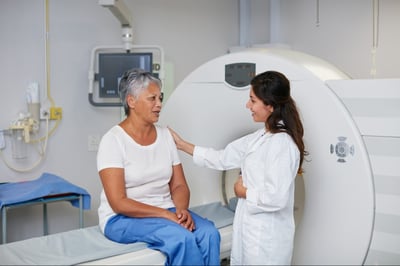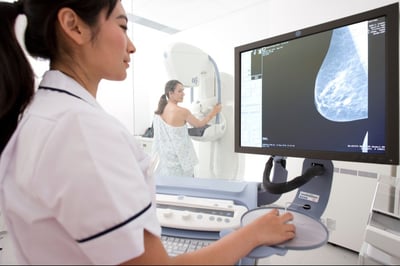Relevant for: previvors, In portal: Breast Cancer



Relevance: High
Most relevant for: Men and women diagnosed with breast cancer who have a BRCA1 or BRCA2 mutation
Study: Understanding the risks of a second cancer after a breast cancer diagnosis in people with BRCA1 and BRCA2 mutations
After breast cancer, people who have a BRCA1 or BRCA2 mutation face a greater risk of a second cancer compared to individuals without a BRCA mutation. This study helps to better understand this risk so that breast cancer survivors with mutations can receive informed, personalized plans for surveillance and follow-up care. (Posted 12/11/25)
READ MORE ›


Relevance: Medium-High
Most relevant for: People with BRCA mutation who have textured breast implants
Study: Possible link between BRCA1 and BRCA2 mutations and rare breast implant-associated lymphoma
The causes of breast implant-associated anaplastic large cell lymphoma (BIA-ALCL), a rare cancer that develops near implants, are unknown. Results from this study suggest that people with an inherited mutation in BRCA1 or BRCA2 may be at increased risk for BIA-ALCL. However, because very few cases of BIA-ALCL occurred among participants, more research is needed to confirm or refute this finding. (Posted 7/14/2025)
READ MORE ›


Relevance: Medium-High
Most relevant for: People at high risk for hereditary cancer
Guideline: Hereditary cancer gene guidelines expand
The National Comprehensive Cancer Network regularly updates guidelines for several types of hereditary cancer. These recommendations often change when new research is published. Recently, the NCCN expanded its guidelines to include information on hereditary prostate and gastric cancers. (Posted 1/6/25)
Este artículo está disponible en español.
READ MORE ›


Relevance: Medium-High
Most relevant for: People with an inherited mutation in CDH1
Study: Lifetime cancer risks in people with an inherited mutation in CDH1
This study looked at the lifetime risks of stomach and breast cancer in families with a known CDH1 mutation. Results from the study suggest that for some CDH1 mutation carriers lifetime stomach cancer risk is lower than previous research has shown. Additionally, study results show that the lifetime risk of breast cancer is similar to previous lifetime risk estimates in women with mutations in this gene. (Posted 12/10/24)
Este artículo está disponible en español.
READ MORE ›


Relevance: Medium
Most relevant for: People considering fertility preservation.
Study: Impact of breast cancer and BRCA mutations on fertility preservation
Timely family planning discussions are important for people diagnosed with breast cancer as well as those who have an inherited a BRCA1 or BRCA2 mutation. This study looked at the number of mature eggs recovered when ovaries were stimulated for fertility preservation or preimplantation genetic testing among three groups and found that the number of eggs collected was similar. (Posted 10/31/24)
Este artículo está disponible en español.
READ MORE ›


Relevance: Medium-High
Most relevant for: People with a BRCA1 or BRCA2 mutation who are considering breast MRI screening
Study: Yearly breast MRI screening improves outcomes for women with inherited BRCA mutations
An international research study of yearly breast MRI screening among women with BRCA1 and BRCA2 gene mutations found that BRCA1 carriers who had MRI screenings were less likely to die of breast cancer than those who did not. Additional studies with more BRCA2 mutation carriers are needed to determine if yearly breast MRIs reduce deaths from breast cancer in this group. (Posted 6/24/24)
Este artículo está disponible en español.
READ MORE ›


Relevance: Medium
Most relevant for: People with HR-positive and HER2-negative metastatic breast cancer. People with silicone breast implants. People considering thermography screening
Update: News from the FDA– new breast cancer treatment, thermography warning and implant screening updates
This XRAY review is a summary of FDA breast cancer updates from July to December 2023. This includes a new drug approval and two consumer updates. (Posted 2/21/24)
Este artículo está disponible en español.
READ MORE ›


Relevance: Medium
Most relevant for: People at increased risk for breast cancer undergoing prophylactic bilateral mastectomy due to an inherited mutation in BRCA1, BRCA2 or PALB2. People with TNBC who still have breast cancer after chemotherapy.
Update: A breast cancer vaccine for people with an inherited BRCA1, BRCA2 or PALB2 mutation
A breast cancer vaccine is showing promise in early clinical trials. Initially, the vaccine was tested in people with triple-negative breast cancer (TNBC) who were at high risk for recurrence. Now the vaccine is being tested to lower breast cancer risk among people with an inherited mutation in BRCA1, BRCA2 or PALB2. It is also being tested in people with triple-negative breast cancer who are at high risk for recurrence and are taking the immunotherapy drug Keytruda (pembrolizumab) after completing chemotherapy. (Posted 1/31/24)
Este artículo está disponible en español.
READ MORE ›


Relevance: Medium-High
Most relevant for: People interested in the use of artificial intelligence in medicine
Article: Artificial intelligence (AI) may find breast cancer on mammograms sooner
Artificial intelligence (AI) tools may help doctors read mammograms. This assistance may lead to earlier diagnoses of breast cancer. (Posted 9/29/23)
Este artículo está disponible en español.
READ MORE ›


Relevance: High
Most relevant for: People interested in genetic testing.
Article: Genetic testing and the future of medicine
An article published in Katie Couric Media discusses genetic testing and how it can impact health. The author talked with Dr. Robert Steiner, a doctor who specializes in genetics. He talked about genetic testing and how the results can affect health and change lives. (Posted 9/28/23)
Este artículo está disponible en español.
READ MORE ›